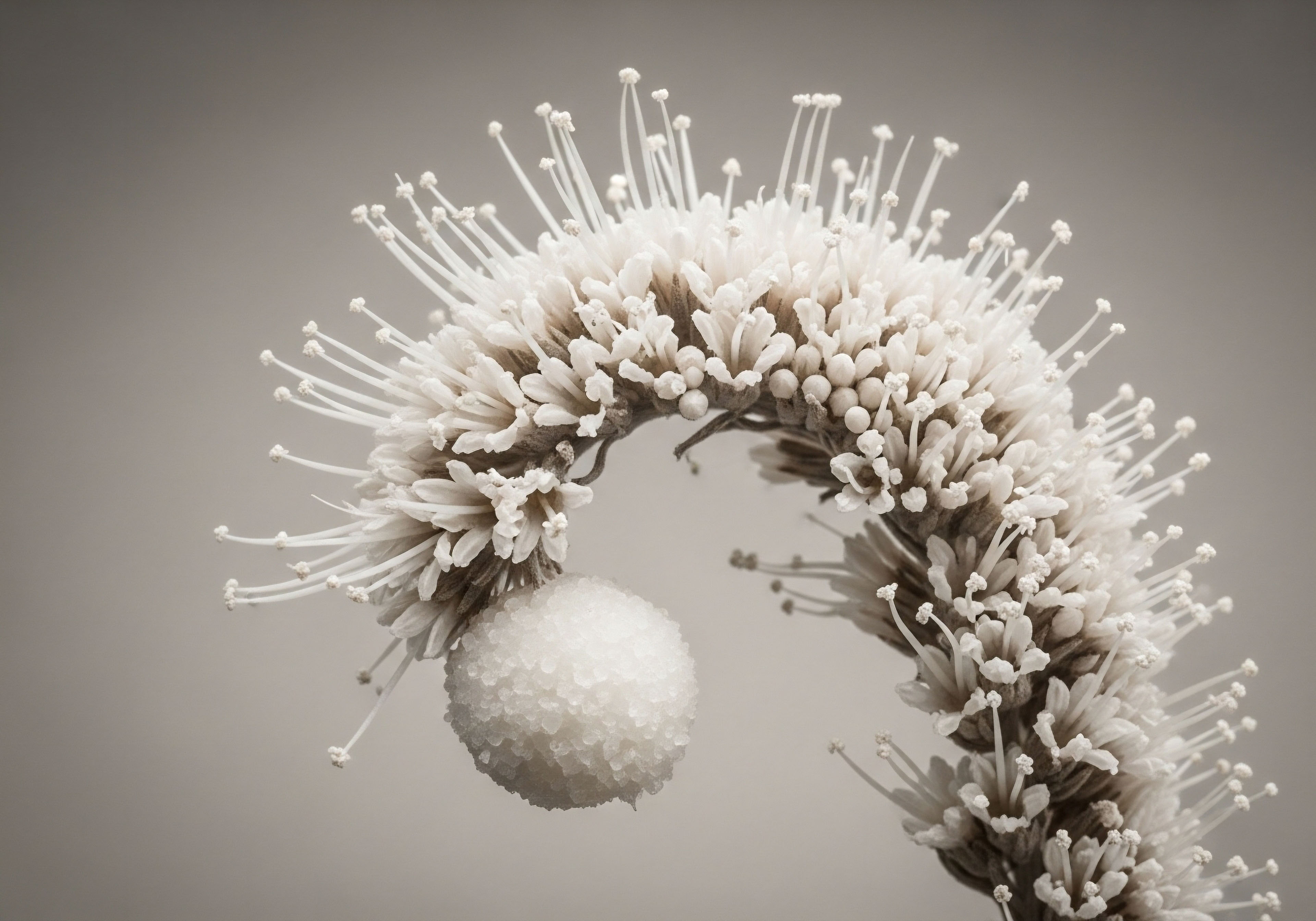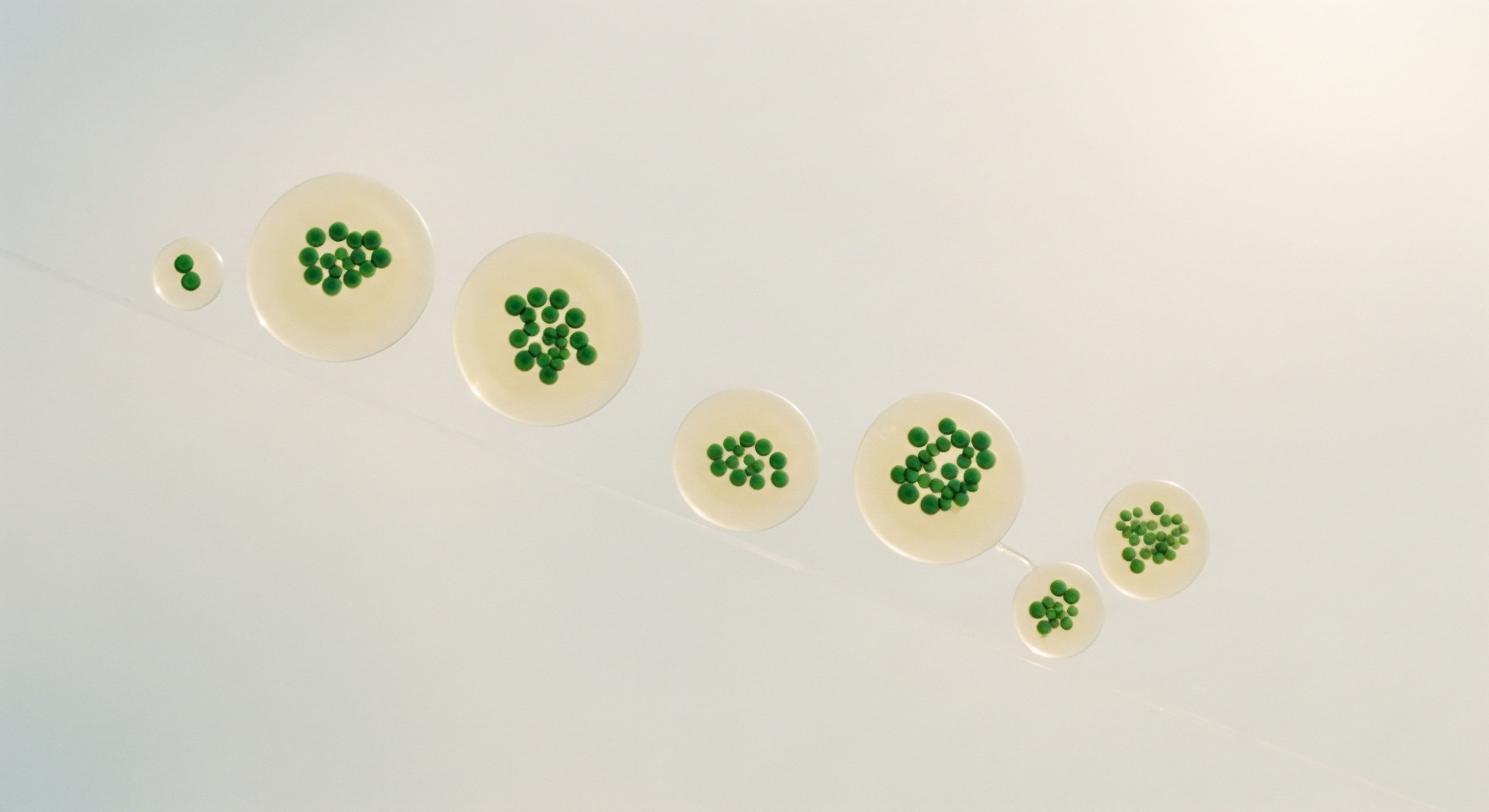

Fundamentals
Have you ever experienced those moments when your body simply feels out of sync? Perhaps a persistent fatigue lingers, your mood shifts unexpectedly, or your physical vitality seems diminished, even when you believe you are making all the right choices for your well-being.
This sensation of imbalance, a subtle yet pervasive disruption, often prompts individuals to seek answers. Many times, the underlying cause traces back to the intricate messaging network within your body ∞ your hormones. These chemical messengers orchestrate countless physiological processes, from energy regulation and mood stability to muscle maintenance and reproductive function. When their delicate balance is disturbed, the ripple effects can touch every aspect of your daily experience.
Understanding your own biological systems represents a powerful step toward reclaiming vitality and function without compromise. Our internal environment, a complex interplay of various systems, significantly shapes how these hormonal signals are produced, processed, and utilized. A key, often overlooked, contributor to this internal balance resides within your digestive tract ∞ the gut microbiome. This vast community of microorganisms, far from being merely involved in digestion, plays a substantial role in systemic health, including the regulation of your endocrine system.
The gut microbiome, a complex community of microorganisms, significantly influences the body’s hormonal balance, extending its impact beyond simple digestive processes.
Steroid hormones, a broad category of these vital chemical messengers, are synthesized from cholesterol and include a diverse array of compounds. Beyond the widely discussed estrogens, this group encompasses androgens like testosterone and dehydroepiandrosterone (DHEA), which are crucial for both male and female health, influencing muscle mass, bone density, and libido.
Also within this category are glucocorticoids, such as cortisol, which manage stress responses and inflammation, and mineralocorticoids, like aldosterone, that regulate blood pressure and electrolyte balance. The body’s ability to produce, activate, and deactivate these hormones is tightly regulated, yet susceptible to external influences.
Emerging scientific understanding reveals a profound connection between the gut microbiome and the metabolism of these steroid hormones. The microorganisms residing in your gut possess an array of enzymes capable of modifying steroid structures. This microbial activity can alter the bioavailability and biological potency of hormones, impacting their systemic levels. This interaction suggests that supporting a healthy gut environment could be a valuable strategy for maintaining hormonal equilibrium, offering a pathway to address those feelings of being out of balance.


Intermediate
The influence of probiotic strains on steroid hormone metabolism extends far beyond their well-documented effects on estrogen. These beneficial microorganisms engage in complex biochemical interactions within the gastrointestinal tract, directly and indirectly modulating the levels and activity of androgens, glucocorticoids, and other steroid compounds. A primary mechanism involves the microbial production of enzymes that act upon hormones as they pass through the gut.
One such enzyme, beta-glucuronidase, produced by various gut bacteria, can deconjugate steroid hormones that have been inactivated by the liver. The liver typically conjugates hormones with glucuronic acid, making them water-soluble for excretion. When beta-glucuronidase removes this glucuronic acid, the hormone becomes biologically active once more, allowing for its reabsorption into the bloodstream.
This process significantly impacts the circulating levels of hormones like testosterone and DHEA. Conversely, some bacterial species possess hydroxysteroid dehydrogenases and steroid reductases, enzymes that can convert active hormones into less potent forms or alter their metabolic pathways entirely. For instance, certain Clostridium species can convert testosterone into less active metabolites through processes like 21-dehydroxylation.
The gut microbiome also influences steroid hormone metabolism through its impact on the enterohepatic circulation. This circulatory pathway involves substances, including steroid hormones and bile acids, being secreted from the liver into the bile, entering the small intestine, and then being reabsorbed back into the liver.
Gut bacteria can modify bile acids, which are synthesized from cholesterol, the precursor for all steroid hormones. Alterations in bile acid metabolism can indirectly affect the availability of cholesterol for hormone synthesis, thereby influencing the entire steroidogenic pathway.
Studies indicate that gut microbes can mediate deglucuronidation, which increases free androgen levels in the mouse cecum and human colon, with deconjugated androgens, such as testosterone and dihydrotestosterone (DHT), present in the bacteria-rich colon at concentrations much higher than those in the serum.
Probiotic strains influence steroid hormones beyond estrogen by modulating gut enzyme activity, impacting enterohepatic circulation, and reducing systemic inflammation.
Beyond direct enzymatic action, probiotics contribute to hormonal balance by mitigating systemic inflammation. Chronic, low-grade inflammation can disrupt the delicate feedback loops of the endocrine system, leading to dysregulation of hormones like cortisol.
Probiotic strains, particularly those from the Lactobacillus and Bifidobacterium genera, are known for their anti-inflammatory properties, helping to maintain gut barrier integrity and reduce the translocation of pro-inflammatory bacterial components into the bloodstream. By fostering a less inflammatory internal environment, probiotics can indirectly support more balanced cortisol regulation, which is crucial for stress response and metabolic health.
Consider the implications for individuals undergoing hormonal optimization protocols. For men receiving Testosterone Replacement Therapy (TRT), a healthy gut microbiome might influence the bioavailability of administered testosterone or its conversion to other metabolites. While TRT protocols often include medications like Anastrozole to manage estrogen conversion, the gut’s role in steroid metabolism suggests an additional layer of influence. Similarly, for women utilizing Testosterone Cypionate or Progesterone, the gut microbiome could modulate the efficacy and metabolic fate of these exogenous hormones.
The table below summarizes some key ways probiotic strains influence various steroid hormones:
| Steroid Hormone Category | Probiotic Influence Mechanism | Potential Impact on Host |
|---|---|---|
| Androgens (Testosterone, DHEA) | Modulation of beta-glucuronidase activity; direct enzymatic conversion by specific bacteria (e.g. Clostridium species); influence on enterohepatic circulation. | Altered circulating levels of active androgens; changes in androgen-to-metabolite ratios; potential impact on muscle mass, libido, and energy. |
| Glucocorticoids (Cortisol) | Modulation of the gut-brain-axis and HPA axis; reduction of systemic inflammation. | Improved stress response; more balanced cortisol levels; potential for better sleep and mood regulation. |
| Mineralocorticoids (Aldosterone) | Indirect influence via gut-kidney axis; impact on systemic inflammation and electrolyte balance. | Potential modulation of blood pressure regulation; influence on fluid balance. |
This complex interplay underscores why a holistic approach to hormonal health, one that considers the foundational role of the gut microbiome, holds significant promise for achieving comprehensive well-being.


Academic
The intricate relationship between probiotic strains and steroid hormone metabolism extends into the molecular and systems-biology domains, revealing a sophisticated network of interactions that shape endocrine function. This deep dive into endocrinology necessitates a close examination of specific enzymatic pathways, microbial species, and their systemic consequences. The gut microbiome, often termed a “superorganism,” possesses a metabolic capacity that rivals the liver, particularly in its ability to biotransform steroid compounds.
One of the most compelling areas of investigation concerns the microbial modification of androgens. Research indicates that certain gut bacteria, such as Clostridium scindens, can convert glucocorticoids into androgens through side-chain cleavage, a process mediated by specific operons like desABCD.
The desC gene, for example, encodes 20α-hydroxysteroid dehydrogenase (HSDH), an enzyme that catalyzes a chemical intermediate in the biosynthesis of androgens, specifically 17α-hydroxyprogesterone (OHP) production. This enzymatic activity highlights a direct microbial contribution to the androgen pool, independent of the classical adrenal or gonadal pathways.
Furthermore, the influence on testosterone levels is multifaceted. While some bacteria, like Bacteroides species, produce beta-glucuronidase, which can deconjugate testosterone-glucuronide, potentially increasing free testosterone levels available for systemic circulation, other microbes, such as Comamonas testosteroni, utilize testosterone as a carbon source, thereby reducing its circulating amount.
This bidirectional influence underscores the importance of microbial community composition. A balanced gut environment, supported by diverse probiotic strains, might therefore contribute to optimal testosterone bioavailability and metabolism, which is a critical consideration for individuals undergoing Testosterone Replacement Therapy (TRT). The efficacy of exogenous testosterone administration, whether through weekly intramuscular injections of Testosterone Cypionate or subcutaneous injections for women, could be modulated by the recipient’s gut microbial landscape.
The gut microbiome’s enzymatic capabilities directly influence steroid hormone bioavailability and metabolism, impacting systemic levels of androgens and glucocorticoids.
How do probiotic interventions affect the hypothalamic-pituitary-adrenal axis? The hypothalamic-pituitary-adrenal (HPA) axis, the body’s central stress response system, is profoundly influenced by the gut-brain axis. Probiotic strains can modulate HPA axis activity, thereby impacting cortisol levels.
While some studies show conflicting results regarding direct cortisol reduction, a meta-analysis of 46 randomized controlled trials indicated that probiotic supplementation may reduce cortisol levels, particularly in healthy populations and when single probiotic strains are used.
This effect is likely mediated through the gut microbiota’s ability to produce neurotransmitters, short-chain fatty acids (SCFAs), and other signaling molecules that communicate with the brain via the vagus nerve and immune pathways. For instance, SCFAs like butyrate, acetate, and propionate, produced by beneficial bacteria, can cross the blood-brain barrier and influence neuronal function and HPA axis regulation.
The impact on DHEA and its sulfated form, DHEA-S, also warrants consideration. DHEA is a precursor to other steroid hormones, including androgens and estrogens. While direct evidence of probiotic-induced changes in DHEA-S levels remains less conclusive, some research suggests that probiotics can reduce the cortisol:DHEA-S ratio, which is a marker of adrenal stress response.
This implies that while DHEA-S levels might not change significantly, the body’s overall stress resilience and hormonal balance could improve. This is particularly relevant for anti-aging and vitality protocols, where maintaining a healthy cortisol:DHEA-S ratio is often a target.

What Microbial Enzymes Shape Steroid Hormone Pathways?
The enzymatic repertoire of the gut microbiome is vast and diverse, enabling a wide array of steroid biotransformations. Key enzymes involved include:
- Beta-glucuronidase (GUS) ∞ This enzyme deconjugates glucuronidated steroids, reactivating them for reabsorption. High GUS activity can lead to increased circulating levels of active hormones.
- Hydroxysteroid Dehydrogenases (HSDs) ∞ These enzymes catalyze the interconversion of various steroid hormones, altering their biological activity.
For example, 3β-HSD is involved in the synthesis of all steroid hormones from pregnenolone.
- Steroid Reductases ∞ These enzymes, such as 5β-reductase, can reduce steroid hormones to their less active dihydro or tetrahydro forms.
Clostridium steroidoreducens is a bacterium known for its ability to reduce cortisol, progesterone, and testosterone to 3β,5β-tetrahydrosteroid products via the OsrABC pathway.
- Aromatase-like activity ∞ While less common, some gut microbes may possess enzymes that can aromatize androgens into estrogens, adding another layer of complexity to sex hormone balance.
The implications for personalized wellness protocols are substantial. For individuals undergoing Growth Hormone Peptide Therapy with agents like Sermorelin or Ipamorelin / CJC-1295, or using Other Targeted Peptides such as PT-141 for sexual health or Pentadeca Arginate (PDA) for tissue repair, optimizing gut health through probiotic interventions could create a more favorable metabolic environment. A balanced microbiome can enhance nutrient absorption, reduce systemic inflammation, and modulate hormonal signals, all of which support the body’s response to these therapeutic agents.

How Does Gut Microbiota Composition Influence Hormone Therapy Outcomes?
The specific composition of an individual’s gut microbiota can significantly influence the efficacy and side effect profile of hormonal optimization strategies. For instance, a microbiome rich in bacteria that deconjugate testosterone might lead to higher free testosterone levels, potentially impacting dosing strategies for TRT. Conversely, a microbiome dominated by androgen-catabolizing bacteria could necessitate adjustments in treatment.
Consider the case of Anastrozole, used in TRT to block estrogen conversion. While its primary action is systemic, the gut microbiome’s role in estrogen metabolism (the estrobolome) suggests a potential, albeit indirect, influence on overall estrogenic load.
Similarly, for men on Post-TRT or Fertility-Stimulating Protocols involving Gonadorelin, Tamoxifen, or Clomid, a healthy gut environment could support the body’s endogenous hormone production and response to these agents. The gut-liver axis, a critical pathway for hormone detoxification and recycling, is heavily reliant on a balanced microbiome. Dysbiosis can impair this axis, leading to altered hormone clearance and recirculation.
The table below provides a deeper look at specific microbial influences on steroid hormones:
| Microbial Genus/Species | Primary Hormonal Influence | Mechanism of Action | Clinical Relevance |
|---|---|---|---|
| Clostridium species (e.g. C. scindens, C. steroidoreducens ) | Androgens, Glucocorticoids | Side-chain cleavage of glucocorticoids to androgens; reduction of cortisol, progesterone, testosterone to tetrahydrosteroids. | Potential for altering androgen pool; impact on cortisol activity. |
| Bacteroides species | Androgens (Testosterone, DHT) | Production of beta-glucuronidase, deconjugating glucuronidated androgens, increasing free forms. | Modulation of free testosterone levels; implications for TRT. |
| Lactobacillus species (e.g. L. rhamnosus, L. plantarum ) | Cortisol, general metabolic health | Modulation of gut-brain axis; reduction of systemic inflammation; SCFA production. | Improved stress response; support for overall metabolic function. |
| Ruminococcus species | Testosterone | Correlation with testosterone levels; involvement in gut homeostasis. | Suggests a role in maintaining healthy testosterone balance. |
| Thauera sp. strain GDN1 | Androgens | Catabolizes androgens, potentially blocking enterohepatic recirculation. | Potential for managing hyperandrogenism. |
This detailed understanding of microbial-hormone interactions provides a compelling argument for integrating gut health strategies, including targeted probiotic supplementation, into comprehensive hormonal optimization and wellness protocols. It underscores the profound interconnectedness of our biological systems and the potential for personalized interventions to restore balance and enhance overall function.

References
- Chiang, Y. R. et al. “Circulating androgen regulation by androgen-catabolizing gut bacteria in male mouse gut.” Gut Microbes, vol. 14, no. 1, 2023.
- Colldén, H. et al. “The gut microbiota is a major regulator of androgen metabolism in intestinal contents.” American Journal of Physiology-Endocrinology and Metabolism, vol. 317, no. 6, 2019, pp. E1079-E1089.
- Ridlon, J. M. et al. “Clostridium scindens ∞ a human gut microbe that transforms glucocorticoids into androgens.” Journal of Lipid Research, vol. 54, no. 10, 2013, pp. 2835-2845.
- Shin, J. H. et al. “Correlation between gut microbiota and sex steroid hormone levels in men and women.” Journal of Clinical Endocrinology & Metabolism, vol. 104, no. 12, 2019, pp. 5925-5934.
- Sikorska, K. et al. “Effect of Probiotics Supplementation on Cortisol Levels ∞ A Systematic Review and Meta-Analysis.” Nutrients, vol. 16, no. 21, 2024, p. 3516.
- Lalitsuradej, S. et al. “The changes in salivary cortisol and DHEA-S levels after probiotics intervention.” Journal of Clinical and Translational Research, vol. 6, no. 4, 2020, pp. 493-498.
- Markle, J. G. M. et al. “Sex differences in the gut microbiome drive hormone-dependent autoimmune disease.” Science, vol. 339, no. 6123, 2013, pp. 1084-1088.
- Baker, J. M. et al. “Estrogen ∞ gut microbiome axis ∞ A new paradigm for understanding estrogen-related conditions.” Journal of Steroid Biochemistry and Molecular Biology, vol. 172, 2017, pp. 47-52.
- Adlercreutz, H. et al. “Effect of dietary components, including lignans and phytoestrogens, on the metabolism of estrogens and related compounds.” Journal of Steroid Biochemistry, vol. 20, no. 2, 1984, pp. 473-477.
- Ohlsson, C. et al. “The gut microbiota is a major regulator of androgen metabolism in intestinal contents.” American Journal of Physiology-Endocrinology and Metabolism, vol. 317, no. 6, 2019, pp. E1079-E1089.

Reflection
As you consider the intricate connections between your gut microbiome and steroid hormone metabolism, a deeper appreciation for your body’s inherent wisdom may take root. This exploration of complex biological systems is not merely an academic exercise; it is an invitation to introspection about your personal health journey. Recognizing the profound influence of your internal microbial ecosystem on your hormonal landscape opens new avenues for proactive well-being.
The knowledge gained here serves as a foundational step. Your unique biological blueprint necessitates a personalized approach to wellness. Understanding how probiotic strains can modulate steroid hormones beyond estrogen provides a powerful lens through which to view symptoms and goals. This perspective encourages a partnership with your body, listening to its signals and supporting its innate capacity for balance.
Reclaiming vitality and optimal function often begins with this informed self-awareness, guiding you toward tailored strategies that truly honor your individual needs.



